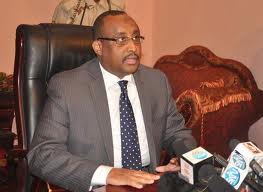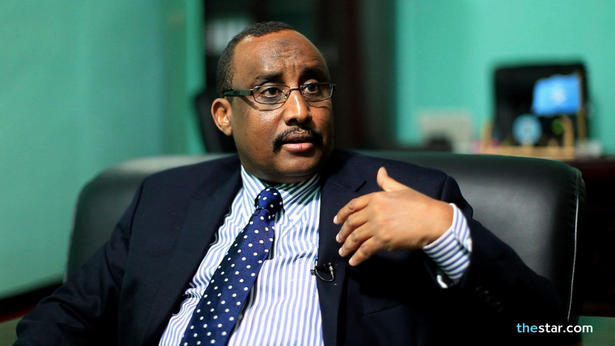By Mohamoud A Gaildon
President elect Abdiweli Gas’s victory promises to settle a hot debate: Is the clan-based model of government viable?
Like many others, I hold the view that only the most demagogic of leadership can emerge through the ranks of the clan. Yet, I am willing to wait and see if Dr. Gas can prove us wrong. Should he buck the trend, as I hope he will, he can be the type of leader Somalia lacks and sorely needs. True, he is not new to the political arena: he served as Prime Minister under President Sh. Shariff. But the post of Prime Minister is too confining for anyone to come to full bloom. And so, Dr. Gas deserves a pass for any past shortcomings. The chance is now golden, though, for him to show his vision and prove his mettle. Whether he to the occasion rises, and a nation rouses, or turns out to be a pointless dud time will tell. But, in my humble opinion, his performance in the following areas will to a large measure have far-reaching consequences for him as a politician and for Somalia.
Ability to Connect with the Common Folk
 Among all the frailties of contemporary Somali leadership, none stands more stark, nor more crippling, nor yet more pervasive than the inability to effectively communicate with the masses. At a time of mind-boggling conundrums, our vanishing art of verbal communication is the biggest conundrum of all. Here is a nation long dubbed the Nation of Poets, a people with a tradition that accords the highest regard to eloquence in prose and verse, now unable to produce the type of orators of years past when our people rallied around mesmerizing speakers for a noble cause. Yet, here too, Dr. Gas can be forgiven for deficiency in that particular faculty, should it exist. A big obstacle though this may be, he can yet strive to make up for it in other ways: framing his message in clear and simple terms; engaging the common folk in conversation and listening to what they have to say; developing a compassionate touch; displaying honesty, fairness, and hard work.
Among all the frailties of contemporary Somali leadership, none stands more stark, nor more crippling, nor yet more pervasive than the inability to effectively communicate with the masses. At a time of mind-boggling conundrums, our vanishing art of verbal communication is the biggest conundrum of all. Here is a nation long dubbed the Nation of Poets, a people with a tradition that accords the highest regard to eloquence in prose and verse, now unable to produce the type of orators of years past when our people rallied around mesmerizing speakers for a noble cause. Yet, here too, Dr. Gas can be forgiven for deficiency in that particular faculty, should it exist. A big obstacle though this may be, he can yet strive to make up for it in other ways: framing his message in clear and simple terms; engaging the common folk in conversation and listening to what they have to say; developing a compassionate touch; displaying honesty, fairness, and hard work.
Building State Institutions
It is all about institutions! I heard Dr. Gas say at a conference in Minneapolis. No one knows this more than he, a PhD of the Harvard School of Government. Well, he now has all of Puntland to put his vision and skills of institution building to the test. After all, the biggest knock on Puntland is that it is a state without viable institutions.
Fair and Equitable Distribution of Resources
Puntland is more than the privileged Bossaso-Qardho-Garowe-Galkayo corridor. Such has been the norm in Puntland, however, that since its inception only these four towns have greatly benefited from the state. If Puntland is to remain territorially intact, and nationally credible, the vast areas east and west of the privileged corridor must receive due attention.
Khatumo
Puntland lives an unsustainable contradiction. On the one hand, it accords its clan leaders the highest level of authority. On the other, it flagrantly flouts the will of the Sool, Sanag, and Ayn (SSC) Garads. This makes no sense! The Taleeh conference must be allowed to proceed without delay. President Gas can choose to address the conference and plead Puntland’s case as to why SSC should opt to remain in Puntland. Should a majority of the delegates insist on separation, however, Khatumo must be allowed to go its own way.
Minority Rights
To my knowledge, a sizeable number of non-Darood Somalis reside in Puntland, some calling it home for centuries. Yet these Somali citizens remain disenfranchised. Can such a system be a model for other regions of Somalia? I hope not! Dr. Gas is required to form a government that is at all levels inclusive and protective of minority rights. If Puntland is to be recognized as a trend setter, it should set one worthy of emulation.
Nation or Clan?
Herein lies Dr. Gas’s ultimate test: Can he turn Puntland into a model state that upholds the supremacy of nation over clan and region?
Dr. Gas is highly educated; but educated is not the same as enlightened; we learn that from Rumsfeld and Cheney. What Somalia needs is enlightened leadership unfettered by the myopic impulses and narrow concerns of the clan. Dr. Gas should look beyond Puntland and to a higher purpose. For as Somalia goes, so go all of its constituent parts, including Puntland. So far, regional leadership has meant regional scope, which makes the reconstitution of the Somali nation impossible. Having been a leader at the national level, Dr. Gas should more than most be intimately aware that the moral burden on regional leaders extends well beyond the parochial interest of their respective clans.
This is not to ignore the salient, and very real, issues of conflict among Somalis, but only to highlight that such outstanding issues give no one the license to further tear the country apart. On the contrary, these issues of conflict present all of Somalia’s leaders with an opportunity to constructively engage not just each other but, even more important, the Somali public. Dr. Gas can lay it all out in public and make convincing and well formulated arguments as to why his views and the views of Puntland are right for Somalia. Recalcitrance and outright defiance serve no purpose but to prolong the conflict.
Federalism
I hold the view that the constitutionally adopted federalism can be only of a tribalnature; and, for Somalia, tribal Federalism is suicidal. This issue has never been subjected to intense national debate or dialogue. Specifically, proponents of Federalism have never given a convincing argument as to why they so tenaciously hold on to the messianic belief that a segmented, predominantly pastoral, society can successfully and peaceably adopt Federalism and emerge as a viable nation in a dangerous and murky corner of the world. Be that as it may, and as things now stand, Dr. Gas has a chance to advance the debate on Federalism. As the proponent in chief of Federalism in Somalia, Puntland has a moral duty to offer a comprehensive national plan for its implementation. Show us a plan that makes sense and we will listen. Jinni ninikii keenaa bixiya!
Conclusion
State President Abdweli Gas has the opportunity to be a different type of leader: one that can have a transformative impact on the nation. And if he does, he may yet once again one day become a national leader. But he can also be just another demagogue in a country plagued with many such. Either way, his political fate and the future direction of Somalia hang in the balance. The road is clear, and the choice is his. But it certainly is my hope that Dr. Gas’s arrival as the President of Puntland will to Somalia usher in a new dawn of change.
Mohamoud A Gaildon
Email: mgaildon@aol.com


Leave a Reply